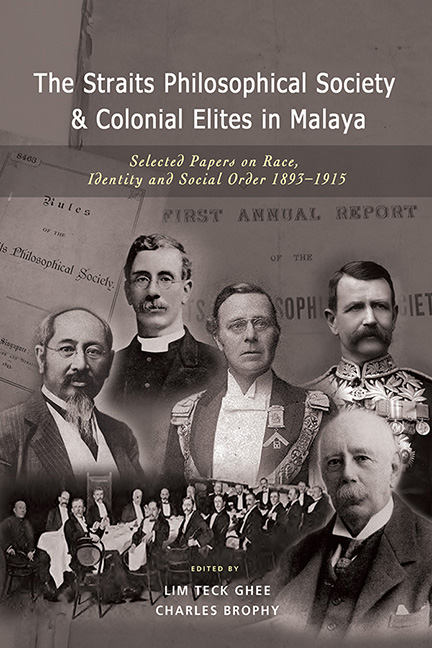 The Straits Philosophical Society and Colonial Elites in Malaya
The Straits Philosophical Society and Colonial Elites in Malaya Published online by Cambridge University Press: 09 January 2024
Editors’ Note
Napier’s paper, presented in the early years of the Society, is significant for its comparison of Dutch and English colonial systems at a time when the subject of land policy was being debated in the colony. In comparing the two systems, Napier joined a tradition of contrasting the Dutch Cultivation System with Britain’s liberal colonial policy. This was prominent in the writings of Stamford Raffles and John Crawfurd in the early nineteenth century. So too was it prominent in J.W.B. Money’s journey to Java in the aftermath of the Indian Mutiny of 1857, as well as later in Alfred Russel Wallace’s support in The Malay Archipelago (1869) for the Dutch protectionist system, which he saw as superior to the exposure of native populations to free competition.
The paper compares the British and Dutch systems by focusing upon the divergent principles which underlay their approaches to land policy. British liberalism, with its aim to produce a market in land, was criticized by Napier for its tendency to lead to the displacement and indebtedness of native populations. This was contrasted with the “picture of prosperity and order” he had witnessed in the Dutch Indies, based upon their protection of customary land law. These positions reflected earlier debates between Swettenham and Maxwell in Malaya. On Napier’s part, whilst he was not uncritical of the Dutch, his experience led him to call for a more protectionist ethos and he would go on to provide justifications for Malay land reservations: “where a race is found by a conquering European power to be in possession of the land of the country, it is permissible—nay, it is the duty of that power by its legislation to prevent that race being ousted”.
Ridley, in his response, also criticized Britain’s liberal approach. He argued that the “natives” did not appreciate the “high technicalities” of English law, and suggested that in other areas the British could learn from the Dutch. They could follow the Dutch regulations on the movement of natives and their curfew system.
To save this book to your Kindle, first ensure [email protected] is added to your Approved Personal Document E-mail List under your Personal Document Settings on the Manage Your Content and Devices page of your Amazon account. Then enter the ‘name’ part of your Kindle email address below. Find out more about saving to your Kindle.
Note you can select to save to either the @free.kindle.com or @kindle.com variations. ‘@free.kindle.com’ emails are free but can only be saved to your device when it is connected to wi-fi. ‘@kindle.com’ emails can be delivered even when you are not connected to wi-fi, but note that service fees apply.
Find out more about the Kindle Personal Document Service.
To save content items to your account, please confirm that you agree to abide by our usage policies. If this is the first time you use this feature, you will be asked to authorise Cambridge Core to connect with your account. Find out more about saving content to Dropbox.
To save content items to your account, please confirm that you agree to abide by our usage policies. If this is the first time you use this feature, you will be asked to authorise Cambridge Core to connect with your account. Find out more about saving content to Google Drive.